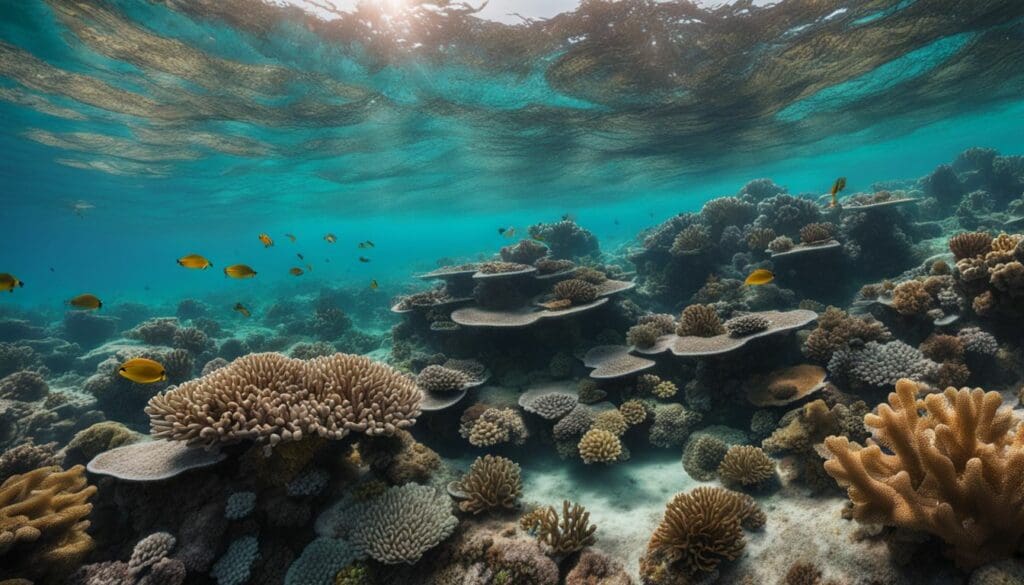The magnificent underwater tapestry, a swirl of colours hidden beneath the waves, is sadly losing its vibrancy, transitioning to pallid tones that signal distress within these crucial habitats.
Like many of us across the globe, we’ve looked on with growing trepidation as coral bleaching mercilessly robs reefs of their vitality and splendour. Our in-depth investigation into this predicament has laid bare a truth: this isn’t merely a matter of losing natural beauty – it’s about jeopardising the existence of an estimated one-quarter of marine species that rely on flourishing reefs for their survival.
As we further explore our findings, we uncover not just challenges but also opportunities for action—because it turns out there are ways each one of us can make a difference. Immerse yourself in our insights as we unpack how to respond to our warming seas’ pressing alarm bells — together.
Keep your spirits buoyed; despite everything, hope remains very much alive!
Key Takeaways
- Coral bleaching is a process where corals expel the algae living in their tissues when under stress from factors like higher ocean temperatures and pollution, leading to a loss of vibrant colour and vitality.
- The Florida Aquarium’s Project Coral aims to combat the effects of coral bleaching through research, restoration efforts, and growing corals in laboratories for reintroduction to natural habitats.
- NOAA scientists have issued warnings about rising ocean temperatures threatening coral reefs globally with increased incidents of bleaching that could lead to irreversible damage if not addressed urgently.
- Rising sea temperature caused by climate change is the primary cause of coral bleaching events which put marine biodiversity at risk as ecosystems decline due to stressed and dying coral reefs.
- Immediate actions such as managing overfishing, reducing industrial pollution, supporting coastal management initiatives, promoting responsible tourism, advocating for strong climate policies, and engaging in coral conservation can help mitigate further damage to these critical ecosystems.
What is Coral Bleaching?
Coral bleaching occurs when corals expel the algae living in their tissues, causing them to turn completely white. This is commonly caused by heat stress, pollution, and other environmental changes.
It can have a devastating impact on marine life and ecosystems.
Definition
Coral bleaching occurs when ocean temperatures rise, causing corals to lose the vibrant algae that live in their tissues. Without these algae, known as zooxanthellae, coral reefs turn white and are stripped of their primary food source.
This phenomenon is not just a change in colour; it signals severe stress which can lead to coral death if conditions do not improve. As we discuss this issue, let’s remember that healthy reefs are crucial for marine biodiversity and coastal protection.
Heat stress from increased ocean temperatures is the main trigger for this alarming process – think of it as a fever sweeping through an organism’s body. When water becomes too warm, corals expel the life-giving algae in a desperate attempt to survive.
These warming waters don’t just come out of nowhere; they’re directly linked to climate change effects like greenhouse gas emissions. It’s essential for us to understand how our actions on land impact life under the sea.
Causes of Coral Bleaching
Coral bleaching is triggered by several factors, including:
- Increase in ocean temperatures: Elevated water temperatures stress the coral, leading to the expulsion of colourful algae known as zooxanthellae.
- Pollution and runoff: Runoff containing pollutants from agricultural activity and coastal development can degrade water quality and cause stress to coral.
- Overexposure to sunlight: Extended periods of bright sunlight can put additional pressure on corals already under stress from other factors.
- Ocean acidification: Excess carbon dioxide in the atmosphere dissolves into seawater, making it more acidic and affecting the ability of corals to build their calcium carbonate skeletons.
- Extreme weather events: Storms, hurricanes, and cyclones can physically damage coral reefs and exacerbate existing environmental stressors.
Impact on Marine Life
Marine life suffers when coral bleaching occurs. Fish, turtles, and other creatures lose their homes as corals die off. The loss of biodiversity affects the entire ocean ecosystem.
Marine heat waves lead to mass bleaching events which put the lives of countless species at risk.
Ocean temperature rise also causes algae loss, leaving many marine creatures without a vital food source. When coral reefs degrade due to bleaching, it can result in coral disease outbreaks that further harm marine life.
Recent News and Warnings on Coral Bleaching
NOAA scientists have issued a warning about the extreme ocean temperatures affecting Florida’s coral reef, causing potential bleaching events elsewhere. The warming oceans are a growing concern for the health of coral reefs around the world.
NOAA Scientists Sound the Alarm
NOAA scientists warn about the alarming increase in ocean temperatures, leading to widespread coral bleaching. Their research shows that warmer waters are putting immense stress on coral reefs worldwide, jeopardising marine biodiversity.
The scientists highlight the urgency of addressing climate change and its impact on ocean warming to protect these crucial ecosystems from irreversible damage.
Rising to prominence in conservation efforts, NOAA scientists advocate for immediate action to mitigate global warming’s effects on our oceans. They emphasise the need for collaborative measures and sustained environmental policies to safeguard coral reefs and their vital role in marine habitats.
Extreme Ocean Temperatures Affecting Florida’s Coral Reef
Extreme ocean temperatures are causing significant stress to Florida’s coral reef. This rise in temperature is a direct result of climate change, which is impacting the delicate balance of marine life.
The bleaching of corals due to this extreme heat poses a serious threat to the biodiversity and overall health of the reef ecosystem. Coral restoration efforts and research on coral bleaching are vital in combating these effects and preventing further damage.
Rising ocean temperatures have already led to severe coral bleaching events across Florida’s coral reefs. Without effective intervention, the degradation of these vibrant ecosystems will continue, ultimately affecting global ocean biodiversity.
How Warming Oceans Can Lead to Bleaching
Warming oceans can lead to coral bleaching as increased water temperatures stress the delicate balance of organisms living within the coral. Rising ocean temperatures cause corals to expel algae, which deprives them of their primary food source and gives them their vibrant color.
Without these algae, the corals turn white or “bleach.” As a result, they become more susceptible to disease and eventually perish if conditions do not improve.
These extreme temperature changes also disrupt the delicate symbiotic relationship between corals and algae, leading to widespread loss of biodiversity in coral reefs. The environmental impact is significant as it affects marine life that rely on coral reefs for habitat and food.
Potential Bleaching Events Elsewhere
Scientists are concerned about the potential spread of coral bleaching events to other parts of the world. Rising ocean temperatures could lead to similar devastating impacts on coral reefs in various regions.
The risk of bleaching events elsewhere highlights the urgent need for global action to address climate change and protect marine ecosystems from further degradation.
The Connection between Ocean Warming and Climate Change
The connection between ocean warming and climate change is crucial to understanding the impact on coral bleaching. As global temperatures rise, oceans absorb much of the heat, leading to increased stress on coral reefs and other marine life.
This has significant implications for ocean biodiversity and ecosystems worldwide.
Effects of Climate Change on Ocean Warming
Climate change is causing the ocean to warm at an alarming rate, impacting marine life. The rising temperatures are disrupting ecosystems, leading to coral bleaching and a decline in biodiversity.
As global warming intensifies, the heat absorbed by the oceans increases, posing a significant threat to fragile coral reefs and other aquatic organisms. This rapid ocean warming is directly linked to climate change and human activities such as greenhouse gas emissions, exacerbating the negative effects on underwater habitats.
The warming oceans have far-reaching consequences on marine life, triggering severe stress on corals and accelerating reef degradation due to increased water temperatures. As a result, many coral species face the risk of bleaching – a process that weakens their resilience and ultimately leads to widespread destruction of coral reefs worldwide.
The Role of Oceans in Climate Change
Oceans play a crucial role in regulating the Earth’s climate. They absorb large amounts of carbon dioxide from the atmosphere, helping to mitigate the impacts of global warming. Additionally, oceans influence weather patterns and temperatures on land, making them integral to climate systems worldwide.
The exchange of heat between the ocean and atmosphere affects wind patterns and rainfall distribution, ultimately shaping our planet’s climate.
Furthermore, oceans act as a massive heat sink, absorbing solar radiation and significantly impacting temperature regulation on Earth’s surface. This thermal capacity helps stabilise global temperatures by distributing warmth around the world.
Efforts to Save Coral Reefs
The Florida Aquarium has launched Project Coral to grow and restore coral reefs. Researchers are actively studying coral bleaching to find solutions, and efforts are being made to prevent further damage to these vital ecosystems.
Project Coral by The Florida Aquarium
Project Coral by The Florida Aquarium aims to save coral reefs through groundbreaking research and innovative conservation efforts. Through pioneering work in coral husbandry, the project is successfully growing corals in a lab setting, which are then reintroduced to their natural habitats, helping rejuvenate degraded reefs.
This hands-on approach has contributed significantly to understanding and mitigating the impact of ocean warming and bleaching events on coral ecosystems. The Florida Aquarium’s project represents a beacon of hope for the future survival of these vital marine ecosystems.
The Florida Aquarium’s Project Coral is leading the charge in combating the devastating effects of coral bleaching by actively working towards restoring damaged reef systems. This proactive initiative serves as a crucial model for other conservation efforts worldwide, offering tangible solutions to protect and preserve ocean biodiversity amidst rising challenges posed by climate change and global warming effects.
Research on Coral Bleaching
Scientists around the world are conducting extensive research on coral bleaching to understand its causes and potential solutions. Through underwater observations, laboratory experiments, and data analysis, researchers are investigating the impact of rising ocean temperatures and other stressors on coral reefs.
They aim to identify strategies for protecting these vital ecosystems from further degradation and restoring their health. By studying bleached corals and monitoring changes in ocean biodiversity, scientists seek to develop innovative approaches that can help mitigate the devastating effects of coral bleaching.
Furthermore, ongoing research plays a crucial role in raising awareness about the urgency of addressing climate change‘s impact on marine environments. The findings contribute to global conservation efforts and provide valuable insights for policymakers, communities, and environmental organisations working towards preserving coral reefs.
Preventing Further Damage
To prevent further damage to coral reefs, we can take immediate action.
- Manage Overfishing: Regulate fishing practices to protect the balance of the marine ecosystem. This helps maintain the natural predators of algae and reef-dwelling species.
- Reduce Pollution: Implement strict regulations on industrial waste disposal and promote sustainable agricultural practices to minimise chemical run-off into the oceans.
- Support Coastal Management: Promote the protection of coastal areas to reduce sedimentation and nutrient pollution, which can harm coral reefs.
- Foster Sustainable Tourism: Encourage responsible tourism practices that minimise physical damage and pollution near coral reef sites.
- Advocate for Climate Action: Support policies and initiatives that aim to reduce carbon emissions and mitigate climate change effects on ocean temperatures.
- Engage in Conservation Efforts: Volunteer with or support organisations dedicated to conserving and restoring coral reefs through research, advocacy, and restoration projects.
Conclusion
In conclusion, coral bleaching is a critical warning sign of our warming oceans. It signifies the devastating impact of rising ocean temperatures on delicate marine ecosystems. Efforts to save coral reefs are essential for preserving ocean biodiversity and combating climate change.
We must act decisively to prevent further degradation and destruction of these vital natural habitats.
FAQs
1. What is coral bleaching and why does it happen?
Coral bleaching occurs when corals become stressed due to rising ocean temperatures, often caused by climate change, leading to reef degradation.
2. Can the destruction of coral reefs affect ocean biodiversity?
Yes, the destruction of coral reefs from stress factors like warming waters can lead to a significant decline in ocean biodiversity.
3. Are there ways to help restore coral reefs that have been damaged?
Certainly! Efforts for Coral reef restoration are underway which involve carefully managed activities aimed at bringing back healthy conditions for reef life.
4. How serious is the impact of climate change on our oceans’ corals?
Climate change has a severe impact on corals; as temperatures rise, we witness more frequent and intense episodes of coral bleaching warning us about the health of our oceans.





